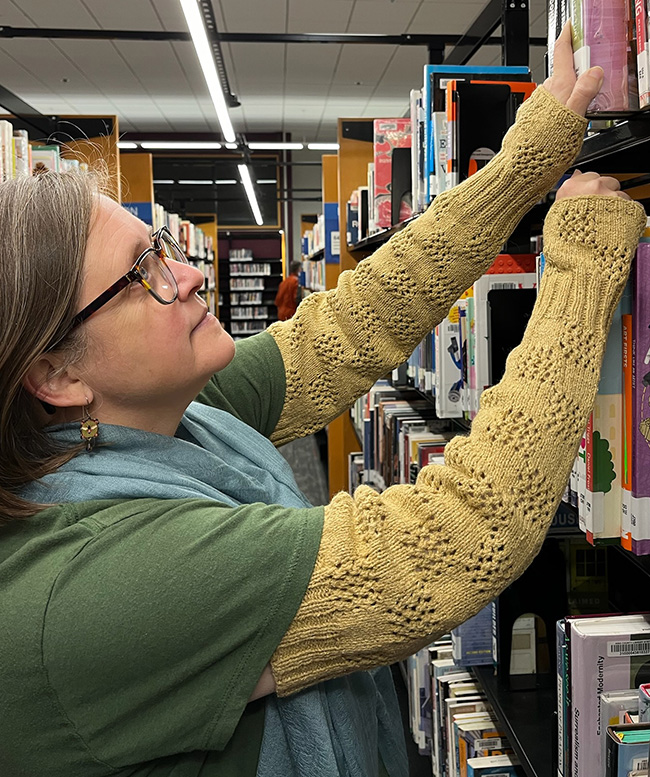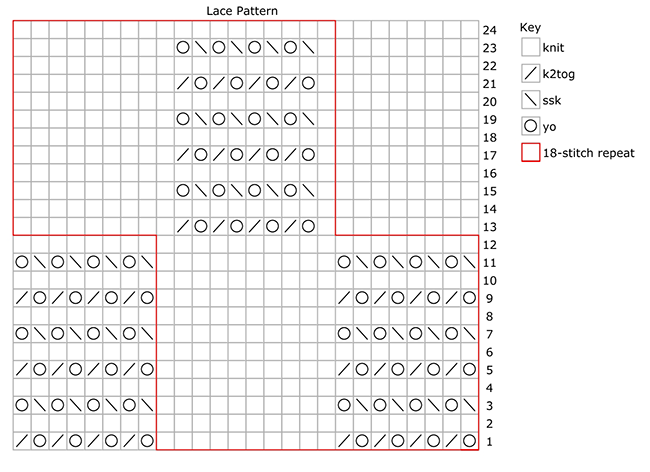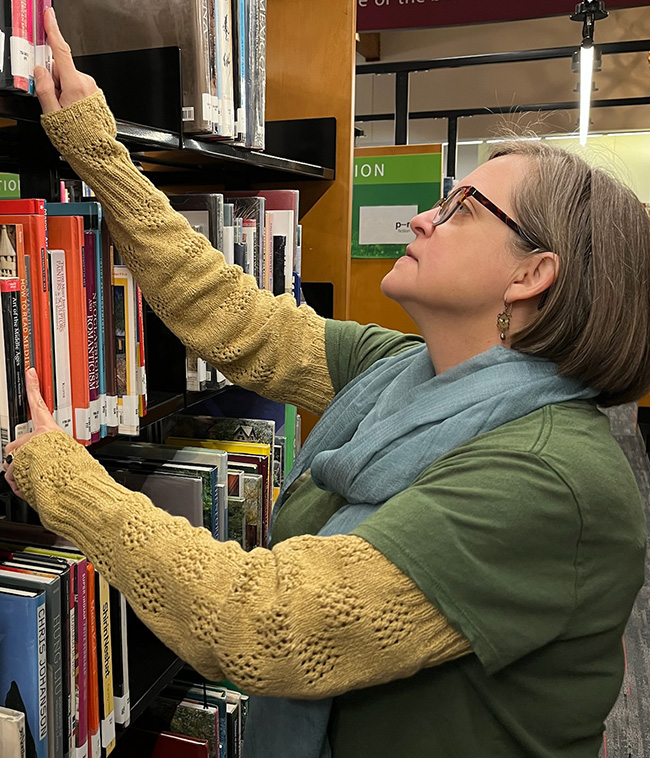Shirtsleeves, a free knitting pattern from Knitty.com.
INTRODUCTION
Shirtsleeves
 by Karen Radcliff
by Karen Radcliff
![]()
In the shoulder season, my shoulders are usually covered by a t-shirt or short-sleeved garment for most of the day. But there are times when bare arms just aren't right—at twilight, when the temperature suddenly dips just a bit, but I'm not ready for a sweater. Sitting in the movie theater. At the library. In my friend's car, when I'm sitting next to the air conditioning vent. Or at a baseball stadium, when a later inning takes the ambience from sunny and warm to breezy and cool. Any time that sudden drop of a few degrees makes me not cold, exactly, but wishing I had something to cover my arms. Driving the car in sunny weather makes me wish for something to cover my arms because they tend to sunburn easily—a state that stop-and-go gridlock doesn't seem to respect. And a friend dealing with menopause loves a few layers that are easy to put on and take off in a moment.
For all of these reasons, I want a pair of Shirtsleeves on hand—a pair in the car, in the picnic basket (maybe in sports team colors?), in my bag. They reach from knuckles to upper arm, snug at the top to stay on, just snug enough at the wrist and hand to stay down. An easy lace pattern and drapey, loose fit encourages airflow, and this wool-silk blend keeps me warm in cool weather and, funny enough, cool in warm weather.
 model: Karen Radcliff
model: Karen Radcliff
 photos: Chris Radcliff
photos: Chris Radcliff
SIZE
Women's XS[S, M, L, 1X, 2X, 3X, 4X, 5X]
shown in size M, with upper-arm cuff of zero ease and 3 inches/7.5 cm positive ease at upper arm below cuff
Choose the size closest to your upper arm circumference, taken at your bicep, just below the underarm; the wrist is designed to be relaxed, much like a sweater sleeve cuff.
FINISHED MEASUREMENTS
Upper arm circumference: 9.5[10.25, 11, 12, 13.5, 15.5, 17, 18.5, 19.5] inches/ 24[26, 28, 30.5, 34.5, 39.5, 43, 47, 49.5] cm
Wrist circumference: 5.25[5.5, 6, 6, 7, 7.25, 7.75, 8, 8.75] inches/ 13.5[14, 15, 15.5, 17.5, 18.5, 19.5, 20.5, 22] cm
Length: 20 inches/51 cm, adjustable to preference (see Pattern Notes)
MATERIALS
Yarn
![]() Elsebeth Lavold Silky Wool [45% wool, 35% silk, 20% nylon; 190yd/174m per 1.8 oz/50 g skein]; color: Wheat; 3[3, 3, 3, 3, 4, 4, 4, 5] skeins.
Elsebeth Lavold Silky Wool [45% wool, 35% silk, 20% nylon; 190yd/174m per 1.8 oz/50 g skein]; color: Wheat; 3[3, 3, 3, 3, 4, 4, 4, 5] skeins.
Yarn Characteristics
![]() The sample shown uses a wool/silk/nylon DK-weight 2-ply yarn with a slightly nubbly texture. It is very lightweight and cottony in feel, and has excellent drape after wet-finishing. The pattern would look best in a semi-solid or solid color to show off the lace pattern, and feel best in a lightweight, drapey DK-weight yarn.
The sample shown uses a wool/silk/nylon DK-weight 2-ply yarn with a slightly nubbly texture. It is very lightweight and cottony in feel, and has excellent drape after wet-finishing. The pattern would look best in a semi-solid or solid color to show off the lace pattern, and feel best in a lightweight, drapey DK-weight yarn.
Recommended needle size
[always use a needle size that gives you the gauge listed below - every knitter's gauge is unique]
![]() 1 set US #3/3.25mm needles for small circumference in the round
1 set US #3/3.25mm needles for small circumference in the round
![]() US #6/4mm needles for small circumference in the round
US #6/4mm needles for small circumference in the round
Notions
![]() stitch markers
stitch markers
![]() yarn needle
yarn needle
GAUGE
32 sts/ 32 rounds = 4 inches/10 cm in ribbing in smaller needle
25 sts/ 36 rounds = 4 inches/10 cm in lace pattern on larger needle
25 sts/ 32 rounds = 4 inches/10 cm in stockinette stitch on larger needles
PATTERN NOTES
[Knitty's list of standard abbreviations and techniques can be found here.]
If you use the pattern as written, the sleeve length between the wrist ribbing and the upper-arm ribbing will be 13.5 inches/34 cm. If you wish to adjust that length, you can modify the rate of increases as outlined below.
The upper-arm ribbing should sit as high up the upper arm as is comfortable, ideally completely tucked under a short sleeve so no arm is bared between the upper-arm ribbing and garment sleeve. You can adjust the length, as below:
To identify ideal arm length, measure from wrist bone up the arm to the armpit. Measure with a bent elbow, to allow room for movement.
Arm length measurement: _____ - 2 inches/5 cm wrist ribbing - 2 inches/5 cm of upper-arm ribbing = _____ . This is measurement A.
Divide A by the number of increase rounds you need to work. For example, for the smallest size, you work 12 increases rounds in total.
If your preferred measurement A is 11 inches, divide
11 inches ÷ 12 increase rounds = .91 inches. This means that you need to increase approximately every .9 inches.For a more precise adjustment, you can do this by rounds, calculating the number of rounds in the length.
Techniques:
CHARTS
Lace Pattern
Work from chart or written isntructions as you prefer.
Worked over a multiple of 18 stitches plus 8:
Rnd 1: [(YO, k2tog) 4 times, k10] to 8 sts before marker, (YO, k2tog) 4 times.
Rnd 2: K.
Rnd 3: [(ssk, YO) 4 times, k10] to 8 sts before marker, (ssk, YO) 4 times.
Rnd 4: K.
Rnds 5-12: Rep Rnds 1-4 2 more times.
Rnd 13: K9, [(YO, K2tog) 4 times, k10] to last 17 stitches, [(YO, K2tog) 4 times, k9].
Rnd 14: K.
Rnd 15: K9, [(ssk, YO) 4 times], k10] to last 17 stitches, [(ssk, YO) 4 times], k9].
Rnd 16: K.
Rnds 17-24: Rep Rnds 13-16 2 more times.

DIRECTIONS

ARMWARMERS (make 2)
Using smaller-sized needles, cast on 52[56, 60, 64, 68, 72, 76, 80, 88] sts. Join, being careful not to twist. Note or mark start of round as you prefer.
Rnd 1-4: (K2, p2) around.
Rnd 5: Knit.
Switch to larger needles.
Rnd 1, size XS, S, M, L, 1X, 2X, 3X, 5X only, establish lace pattern: K 4[6, 8, 1, 3, 5, 7, -, 2] , pm, work lace pattern, working 18-stitch repeat 2[2, 2, 3, 3, 3, 3, -, 4] times, k to last 4[6, 8, 1, 3, 5, 7, -, 2] sts, pm, k to end.
Rnd 1, size 4X only: Work lace pattern, working 18-stitch repeat 4 times
Work as set, keeping stitches outside of markers (as required) in stockinette stitch, until you have completed 16 rnds of lace pattern.
Wrist:
Switch to smaller needles.
Ribbing rnd: (K2, p2) around.
Work ribbing as set for 2 inches/5 cm.
Final rnd, sizes XS, S, M, L, 1X, 2X, 3X, 5X only: Knit.
Final rnd, size 4X only: K1, M1r, k to last st, M1l, k1. 82 sts.
Arm:
Switch to larger needles.
Round 1, increase: K1, M1L, work in pattern as set to last 2 st, M1R, k1. 2 sts increased.
Work 9[9, 7, 5, 5, 3, 3, 2, 2] rounds even.
Repeat the last 10[10, 8, 6, 6, 4, 4, 3, 3] rnds, 11[11, 13, 15, 19, 25, 29, 32, 33] times more.
When you have added 9 sts outside the markers that indicate the beginning and ending of the lace pattern repeat, move the markers outwards 9 sts, towards the start/end of the round. The next time you begin a repeat at Round 1 or Round 13 of the lace pattern, incorporate these 9 extra stitches at each end into the lace pattern (that is, adding an additional block of lace to follow the pattern).
Continue even in pattern as set as required, until you have worked 5 full pattern repeats, or desired length minus 2 inches/5 cm, ending with Rnd 12 or 24 of the pattern.
Switch to smaller needles.
As you work the first ribbing round, remove the markers.
Ribbing rnd: (K2, p2) around.
Work ribbing as set for 2 inches/5 cm.
Bind off using Jeny's Surprisingly Stretchy Bind-Off method, or your preferred stretchy method.
FINISHING
Weave in ends. To block, soak the armwarmers in lukewarm water with a suitable wool wash; roll in a towel and squeeze most of the moisture out, and lay flat to dry.
ABOUT THE DESIGNER
 Karen (she/her) lives in the Pacific Northwest with her husband and daughter and two cats, one of whom considers all blocking knitwear to belong to him. When not knitting (whenever that is), she weaves, spindle-spins, plays board and card games, teaches homeschoolers anthropology, and tries to garden in a rather ineffectual but earnest way.
Karen (she/her) lives in the Pacific Northwest with her husband and daughter and two cats, one of whom considers all blocking knitwear to belong to him. When not knitting (whenever that is), she weaves, spindle-spins, plays board and card games, teaches homeschoolers anthropology, and tries to garden in a rather ineffectual but earnest way.
She can be found on Ravelry as kharold and so erratically on any social media as to be laughable.
Pattern & images © 2024 Karen Radcliff